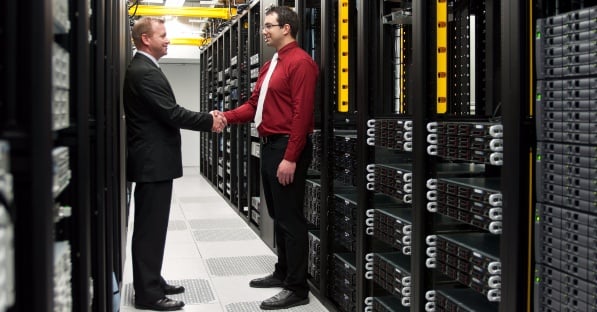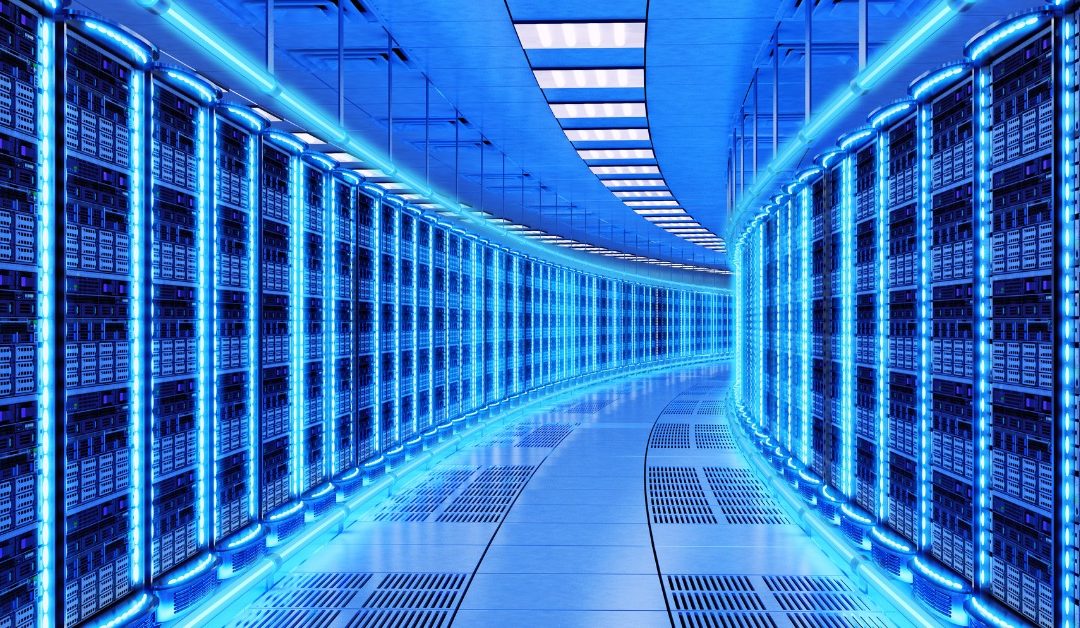Introduction:
In the modern era of technology, data is considered the most valuable asset. Data centers play a crucial role in the storage, processing, and management of data. Data centers are facilities that house computer systems and other related components such as telecommunications and storage systems. They are critical to the functioning of modern society and businesses. Data centers offer many advantages, but they also have some disadvantages that must be considered.

Advantages of Data Centers:
- Scalability: Data centers are highly scalable, which means that they can accommodate the growing needs of businesses. They can be expanded or reduced according to the requirements of the businesses.
- Security: Data centers are highly secure facilities that protect valuable data from unauthorized access, theft, and damage. They have robust security measures in place such as firewalls, access control systems, and CCTV cameras.
- Reliability: Data centers are highly reliable facilities that ensure the continuous availability of data. They have backup power sources, redundant systems, and failover mechanisms to ensure that data is always available.
- Energy Efficiency: Data centers are designed to be highly energy-efficient, which means that they consume less energy compared to other facilities. They use energy-efficient components such as servers, cooling systems, and lighting.
- Cost Savings: Data centers can help businesses save costs in several ways. By outsourcing their data storage and processing needs to data centers, businesses can save on infrastructure, maintenance, and staff costs.
Disadvantages of Data Centers:
- High Initial Investment: Data centers require a significant initial investment to set up. This includes the cost of hardware, software, and infrastructure.
- Maintenance Costs: Data centers require regular maintenance and upgrades, which can be expensive. This includes the cost of replacing hardware, software upgrades, and staffing costs.
- Environmental Impact: Data centers consume a lot of energy, which can have a negative impact on the environment. They also generate a lot of heat, which can increase the need for cooling systems.
- Security Risks: Data centers are highly secure facilities, but they are still vulnerable to security risks such as cyber attacks, theft, and natural disasters.
- Location Constraints: Data centers require specific environmental conditions such as temperature, humidity, and air quality. This means that they cannot be located in any area and require specific geographic locations.
Advantages and Disadvantages of Data Centers
Introduction: Data centers play a crucial role in the modern digital world by providing a centralized location for storing, processing, and managing data. As technology continues to evolve, data centers have become increasingly important for businesses of all sizes. However, there are advantages and disadvantages associated with data centers that businesses need to consider when deciding whether to invest in them. In this article, we will explore the advantages and disadvantages of data centers in detail.
Advantages of Data Centers:
- Increased Reliability: Data centers provide high levels of reliability and uptime, with redundant power and cooling systems, backup generators, and other failover mechanisms. This means that businesses can depend on their data being available at all times, even in the event of a power outage or other unforeseen circumstances.
- Enhanced Security: Data centers are designed with advanced security measures such as access controls, surveillance cameras, fire suppression systems, and other security measures to protect against physical and cyber threats. This level of security is often beyond the reach of most businesses and provides peace of mind knowing that their data is secure.
- Scalability: Data centers can accommodate businesses of all sizes and provide a scalable solution to meet their changing needs. As businesses grow, they can easily upgrade their infrastructure within the data center without having to invest in new hardware or software.
- Cost Savings: Data centers offer economies of scale that are not possible for most businesses to achieve on their own. By sharing infrastructure and resources, businesses can save money on hardware, software, power, and cooling costs.
Disadvantages of Data Centers:
- High Initial Investment: Setting up a data center requires a significant investment in hardware, software, and infrastructure. This can be a barrier to entry for small businesses and startups that do not have the resources to make such a large upfront investment.
- Ongoing Maintenance Costs: Data centers require ongoing maintenance and upgrades to ensure they remain reliable and secure. This can be costly and time-consuming, and businesses must factor in these ongoing costs when considering the total cost of ownership.
- Dependence on Third-Party Providers: Businesses that rely on data centers must depend on the third-party providers for the security and reliability of their data. If the data center experiences an outage or security breach, the business may experience downtime, data loss, or other negative impacts.
- Energy Consumption: Data centers consume a significant amount of energy to power and cool their equipment. This can result in high energy bills and contribute to environmental concerns.
What are the advantages of data centers?
There are several advantages of data centers, including:
a) Scalability: Data centers can be easily scaled up or down depending on the organization’s needs. This means that businesses can quickly expand their IT infrastructure as their needs change.
b) Increased reliability: Data centers are designed to be highly reliable and offer 24/7 uptime. They have backup power supplies and redundant network connections to ensure that they are always available.
c) Improved security: Data centers have a high level of security to protect against unauthorized access, theft, and cyber-attacks. They use multiple layers of security, including physical security measures, firewalls, and encryption.
d) Cost-effective: Data centers can be a cost-effective option for businesses as they can share the cost of IT infrastructure and maintenance with other businesses that use the same facility.
e) Better disaster recovery: Data centers have backup systems and disaster recovery plans in place to ensure that data is not lost in case of a disaster.
What are the disadvantages of data Centre?
Some of the disadvantages of data centers include:
a) High initial costs: Building and maintaining a data center can be expensive. The cost of equipment, facilities, and staff can be prohibitive for some businesses.
b) Dependence on technology: Data centers rely on technology to function, and any disruptions can lead to downtime and loss of data.
c) Energy consumption: Data centers require a lot of energy to operate, which can be costly and have a negative impact on the environment.
d) Security risks: While data centers have strong security measures in place, they are not immune to security breaches. Hackers can still find ways to access sensitive data.
e) Location limitations: Data centers need to be located in areas with good connectivity and power supply, which can limit their availability in certain locations.
What is a data center?
A data center is a facility used to store, manage, and distribute large amounts of data. It typically houses computer systems, storage devices, networking equipment, and other components necessary to support data processing and storage.
What are the advantages of using a data center?
Some of the advantages of using a data center include improved data security, increased reliability and availability of data and applications, better scalability and flexibility, cost-effectiveness, and energy efficiency.
What are the disadvantages of data centers?
Some of the disadvantages of data centers include high initial costs, complex maintenance and management requirements, potential security risks, environmental concerns, and limited control over data and infrastructure.
What is co-location in data centers?
Co-location is a practice where businesses rent space within a data center to house their own IT infrastructure. This allows them to take advantage of the data center’s facilities and services, such as power and cooling, while maintaining control over their own hardware and software.
What are the advantages and disadvantages of co-location?
The advantages of co-location include reduced costs, improved security and reliability, access to better infrastructure and services, and flexibility. The disadvantages include limited control over data and infrastructure, potential security risks, and dependence on the data center’s service quality and availability.
What are the uses of data centers?
Data centers are used for a variety of purposes, including cloud computing, data storage and management, website hosting, e-commerce, streaming services, and artificial intelligence and machine learning applications.
What are the benefits of data center consolidation?
Data center consolidation involves merging multiple data centers into a single, more efficient facility. The benefits include reduced costs, improved resource utilization, simplified management and maintenance, and increased agility and scalability.
What are the disadvantages of traditional data centers?
Traditional data centers often require a significant amount of physical space, cooling and power infrastructure, and maintenance and management resources. They can also be expensive to build and operate, and may have limited scalability and flexibility.
Why are data centers important?
Data centers are essential for businesses and organizations that rely on digital technologies and data processing to operate. They provide a secure, reliable, and efficient environment for storing and managing data and applications, and enable businesses to scale their operations and services as needed.
Conclusion:
Data centers offer a range of benefits to businesses, including increased reliability, enhanced security, scalability, and cost savings. However, they also have their disadvantages, such as high initial investment costs, ongoing maintenance expenses, dependence on third-party providers, and energy consumption. Businesses must weigh the pros and cons of data centers carefully before deciding whether to invest in them. Ultimately, the decision should be based on their specific needs and budget.



